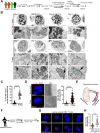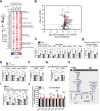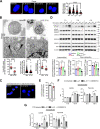This is a preprint.
Interleukin-21 Drives a Hypermetabolic State and CD4+ T Cell-associated Pathogenicity in Chronic Intestinal Inflammation
- PMID: 37333332
- PMCID: PMC10274654
- DOI: 10.1101/2023.06.02.543518
Interleukin-21 Drives a Hypermetabolic State and CD4+ T Cell-associated Pathogenicity in Chronic Intestinal Inflammation
Update in
-
Interleukin 21 Drives a Hypermetabolic State and CD4+ T-Cell-Associated Pathogenicity in Chronic Intestinal Inflammation.Gastroenterology. 2024 May;166(5):826-841.e19. doi: 10.1053/j.gastro.2024.01.026. Epub 2024 Jan 23. Gastroenterology. 2024. PMID: 38266738 Free PMC article.
Abstract
Background & aims: Incapacitated regulatory T cells (Tregs) contribute to immune-mediated diseases. Inflammatory Tregs are evident during human inflammatory bowel disease (IBD); however, mechanisms driving the development of these cells and their function are not well understood. Therefore, we investigated the role of cellular metabolism in Tregs relevant to gut homeostasis.
Methods: Using human Tregs, we performed mitochondrial ultrastructural studies via electron microscopy and confocal imaging, biochemical and protein analyses using proximity ligation assay, immunoblotting, mass cytometry and fluorescence-activated cell sorting, metabolomics, gene expression analysis, and real-time metabolic profiling utilizing Seahorse XF analyzer. We utilized Crohn's disease single-cell RNA sequencing dataset to infer therapeutic relevance of targeting metabolic pathways in inflammatory Tregs. We examined the superior functionality of genetically-modified Tregs in CD4+ T cell-induced murine colitis models.
Results: Mitochondria-endoplasmic reticulum (ER) appositions, known to mediate pyruvate entry into mitochondria via VDAC1, are abundant in Tregs. VDAC1 inhibition perturbed pyruvate metabolism, eliciting sensitization to other inflammatory signals reversible by membrane-permeable methyl pyruvate (MePyr) supplementation. Notably, IL-21 diminished mitochondria-ER appositions, resulting in enhanced enzymatic function of glycogen synthase kinase 3 β (GSK3β), a putative negative regulator of VDAC1, and a hypermetabolic state that amplified Treg inflammatory response. MePyr and GSK3β pharmacologic inhibitor (LY2090314) reversed IL-21-induced metabolic rewiring and inflammatory state. Moreover, IL-21-induced metabolic genes in Tregs in vitro were enriched in human Crohn's disease intestinal Tregs. Adoptively transferred Il21r-/- Tregs efficiently rescued murine colitis in contrast to wild-type Tregs.
Conclusions: IL-21 triggers metabolic dysfunction associated with Treg inflammatory response. Inhibiting IL-21-induced metabolism in Tregs may mitigate CD4+ T cell-driven chronic intestinal inflammation.
Keywords: Inflammatory Bowel Disease; Interleukins; Mitochondria-ER appositions; Pyruvate; Regulatory T cells.
Conflict of interest statement
Disclosures Authors declare no conflicts of interest.
Figures






References
-
- Friedrich M, Pohin M, Powrie F. Cytokine Networks in the Pathophysiology of Inflammatory Bowel Disease. Immunity 2019;50:992–1006. - PubMed
-
- Ng SC, Shi HY, Hamidi N, et al. Worldwide incidence and prevalence of inflammatory bowel disease in the 21st century: a systematic review of population-based studies. Lancet 2018;390:2769–2778. - PubMed
-
- Hirten RP, Iacucci M, Shah S, et al. Combining Biologics in Inflammatory Bowel Disease and Other Immune Mediated Inflammatory Disorders. Clin Gastroenterol Hepatol 2018;16:1374–1384. - PubMed
-
- Neurath MF. Current and emerging therapeutic targets for IBD. Nat Rev Gastroenterol Hepatol 2017;14:269–278. - PubMed
Publication types
Grants and funding
LinkOut - more resources
Full Text Sources
Molecular Biology Databases
Research Materials
